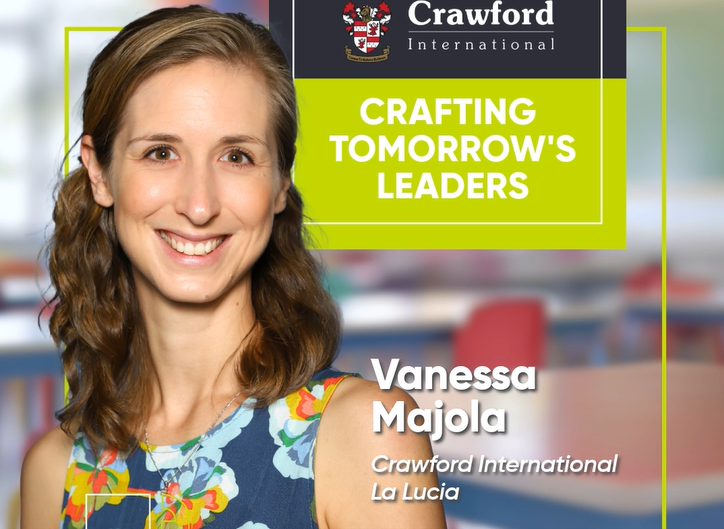Alumni Feature - Hospitable Etienne
September 23, 2022
The hospitality industry allows a great deal of freedom and mobility, as well as rare opportunities to meet and interact with people from all walks of life.

Thus, with so many different avenues available, it isn’t surprising that Etienne Bruwer, Alumnus of Crawford International La Lucia, made Hospitality his career of choice.
Why Hospitality?
Hospitality was embedded in my being since I was a little guy. It was something I grew up with as my parents had one of the first B&Bs in Durban, so hospitality is in my blood. I have strayed from the path a few times of course, but I always get dragged back into the field.
A case of hospitality begins at home.
Yes, growing up our house was full of gatherings, someone was always coming or going. In that time, I learned there is a bigger world out there and I was curious. I just knew, I wanted to explore the world, and hospitality offered me that.
A rewarding profession!
There are only a few careers where you get opportunities to make people feel welcomed, appreciated and valued; hospitality is one of them.
What did you study?
After I matriculated in 2007, I found my place at the Cape Town Hotel School in Granger Bay - part of the Cape Peninsula University of Technology. The course was three years and I accumulated one year of experience in different hospitality backgrounds such as working in the bush in Limpopo and at the Beverly Hills Hotel in Durban. I graduated in 2011, and as chance would have it, I was given the opportunity with Seabourn in Durban, where I became a waiter on their ships.
An experience to remember?
I had the most intense, yet incredible experience of my life. I discovered that the hospitality industry offered a fast-growing future that would develop me professionally, socially, and emotionally. So, it was no surprise that in 2022 I returned to Seabourn again where I am now a Guest Services Specialist, an awesome career opportunity and place to be.
Did you study anything else?
Yes, still within the hospitality realm, I decided to expand my hobby and studied Patisserie, graduating with a diploma from City & Guilds. This qualification saw me work at the Oyster Box Hotel in Umhlanga.
You’ve worked at some amazing places.
I’ve been very fortunate. I also worked in the United States for six months at one of the most popular country clubs, called Boca West. Then my journey took me back to the ships where I saw some of the most remote places, such as Tristan Da Chuna, which is located in the middle of the South Atlantic Ocean.
Are you interested in business within the hospitality industry?
Most definitely. During my time on board the ships, the cook in me mapped out a new venture, a food truck business I called ‘Tres Hermanos Cuban Sandwiches’. Unfortunately, as the business was booming, Covid hit and everything came to a standstill, as well as the business. It didn’t survive.
What advice do you have for young Crawfordians wanting to go into hospitality?
Hospitality is a difficult career to follow. It demands a lot from you, but then it also gives you so much back in experiences. Hospitality companies are interested in hiring innovative people who can share their creative ideas and invent new ways of taking care of customers. Often, we think that life will lead us on the right path, but getting on the wrong train sometimes takes you to the right place. Learn, explore, work hard and believe in yourself. Don’t ever give up, even when you think it’s never going to get better. Remember, we have the bad days so we are able to recognize and enjoy the good ones. You are stronger than you think!
Where do you see this industry going?
Covid has proved to us that people want to travel more now than ever before, we can see it with the cruise ship industry growing as it is. I believe that this industry has become the most profitable and dynamic category in the entire global leisure and tourism sector. However, as we grow, I would hope for more greener ways and to improve our environmental policies thereby making important strides to travel on our planet.
Is your industry fun?
It is fun. All the dynamics, all the responsibilities and the feeling you have when you start training and end up in a managing position, is more than satisfactory at the end of the day. I have the opportunity to meet and socialize with people representing a wide range of nationalities, in an even wider range of places all around the world. What a privilege!
How did Crawford help in preparing you to achieve your goals after school?
Crawford gave me a voice, allowed me to be myself and to become the person I am today. They supported me with choice and moulded my skills to map out the future that I wanted.
What are you passionate about outside your work?
My hobby is making craft beer at home. It was during Covid and the lockdown that I started making beer from scratch – it’s delicious! Not only does it make my friends very happy, but it makes me happy to see them enjoy what I’ve created.
What does the future hold for Etienne?
Once hospitality has run its course, I have a great dream to own a container home that will be fully off the grid and have a negative carbon footprint.
Read more Crawford International Alumni success stories
here.












